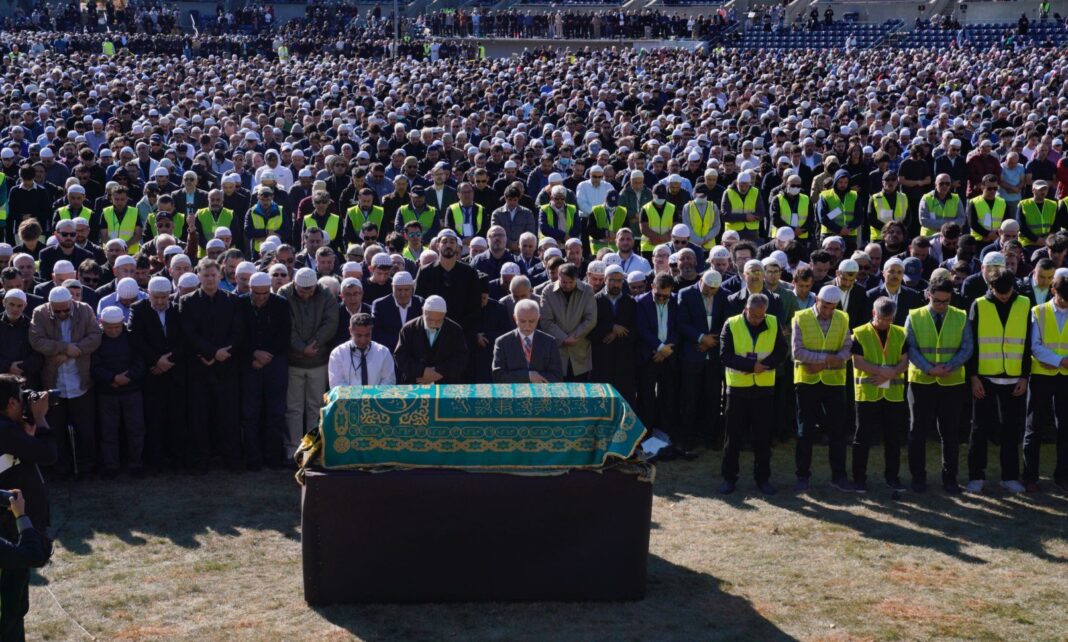Thousands of followers of Turkish-Islamic scholar Fethullah Gülen, along with family members and friends, have gathered today to pay their final respects to the influential spiritual leader, who passed away on October 20 at a Pennsylvania hospital.
Gülen, who inspired a global social movement also known as Hizmet (Service), died at the age of 83 due to multiple health issues related to old age, at St. Luke’s Hospital.
A ceremony was held at Skylands Stadium in Sussex County, New Jersey, which has a large Turkish-American population.
The service included readings from the Quran and tributes to Gülen. Gülen’s casket was draped in a green cloth which featured verses from the Quran.
Following the service, the cleric was laid to rest on the grounds of the Chestnut Retreat Center in Saylorsburg, Pennsylvania, where he spent the last 25 years of his life after moving to the US in 1999 in self-imposed exile. A smaller circle of family and close friends attended the burial.
Followers of Gülen, including women, children and the elderly, traveled from across the United States, Canada, Europe and other parts of the world, forming long lines to enter the stadium on Thursday afternoon.
Organizers put the number of attendees at more than 20,000.
US authorities implemented strict security measures at the stadium, while a helicopter hovered above the crowd during the ceremony.
Farklı açılardan görüntüleri sizlere sunmaya devam ediyoruz.#FethullahGüleneVeda #FarewellToFethullahGulen pic.twitter.com/CjIM7etd8f
— Hizmetten… (@hizmettenson) October 24, 2024
The final decade of Gülen’s life was marked by numerous accusations from the Turkish government, resulting in a significant crackdown on both his actual and perceived followers.
The Turkish government accused him of masterminding corruption investigations in 2013 and a coup attempt in July 2016. Once praised for his movement’s activities in education, interreligious dialogue and charity work, the Turkish government labeled Gülen and his followers as “terrorists” in May 2016.
Muhterem Fethullah Gülen Hocaefendi'nin naaşı cenaze töreninin düzenleneceği stada doğru ilerliyor.#FethullahGüleneVeda #FarewellToFethullahGulen pic.twitter.com/jMZjIB645l
— Hizmetten… (@hizmettenson) October 24, 2024
Gülen and his followers have strongly denied any involvement in the coup or terrorist activities. The government crackdown on the movement’s members continues today in Turkey and abroad, with detentions, arrests and deportations or extraditions of followers from foreign countries.
Tens of thousands of them have been arrested for alleged links to the coup plot; over 130,000 suspected supporters have been dismissed from civil service jobs; and more than 23,000 have been expelled from the military. Hundreds of businesses, schools and media organizations associated with Gülen have also been closed down.
Gülen’s death has been extensively covered by both Turkish and international media. Many Turkish outlets have used hostile language while reporting on his passing, echoing the government’s narrative about his alleged role in the coup attempt.
The state-run Anadolu news agency has flown drones over the Chestnut Retreat Center where Gülen will be buried, and its reporters have been present, trying to gather details about the funeral preparations.
The Turkish government and President Recep Tayyip Erdoğan have vowed to continue their campaign against the movement in light of Gülen’s death, promising to target its followers in Turkey and beyond.
Gülen has never been charged with a crime in the US, and the US government has rejected Turkey’s requests for his extradition due to insufficient evidence against him. The cleric consistently condemned terrorism and the coup plotters.
Meanwhile, discussions are being held about whether the movement will dissolve following Gülen’s departure.
The Alliance for Shared Values, a New York-based, Gülen-affiliated nonprofit organization, said in a statement earlier this week that Gülen’s legacy “transcends the circumstances of his life,” emphasizing that he was “a remarkable religious and intellectual thinker whose impact will be felt for generations.”
Who is Fethullah Gülen?
Fethullah Gülen was born in April 1941 in the eastern Turkish province of Erzurum as the son of an imam. From a young age, he studied the Islamic holy book, the Quran, and was influenced by the views of Kurdish-Islamic scholar Said Nursi. Gülen served as an imam in state-run mosques from 1959 to 1981, during which time he faced multiple investigations and spent time in jail for disseminating anti-secular and religious propaganda.
He rose to prominence as a charismatic preacher in the 1960s in İzmir, known as Turkey’s secular heartland, where he attracted large crowds to his sermons. He encouraged his followers to establish student dormitories, houses and schools rather than mosques.
Following his advice, Gülen’s followers created a vast network of schools in Turkey and internationally, spreading their influence to the Turkic Republics of Central Asia, the Balkans, Africa and the West.
In addition to schools, his movement operates tutoring centers, interfaith dialogue associations and charity organizations globally, although some were closed due to pressure from the Turkish government.
Many companies and media outlets believed to be linked to Gülen were seized or shut down by the government following the coup attempt. The Turkish government justified its actions by citing the threat posed to the state by the coup, despite facing accusations of using the coup as a pretext to crack down on the movement.
The Gülen movement promotes an Islam that is friendly to the West, advocating for free markets, science and interfaith dialogue.
TIME magazine named Gülen one of the hundred most influential people in the world in 2013.
He has more than 100 books on spirituality and interfaith dialogue to his credit, which have been translated into numerous languages.


